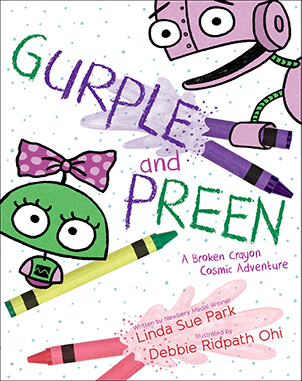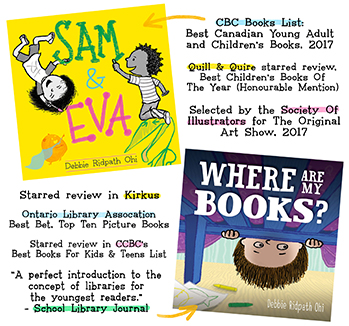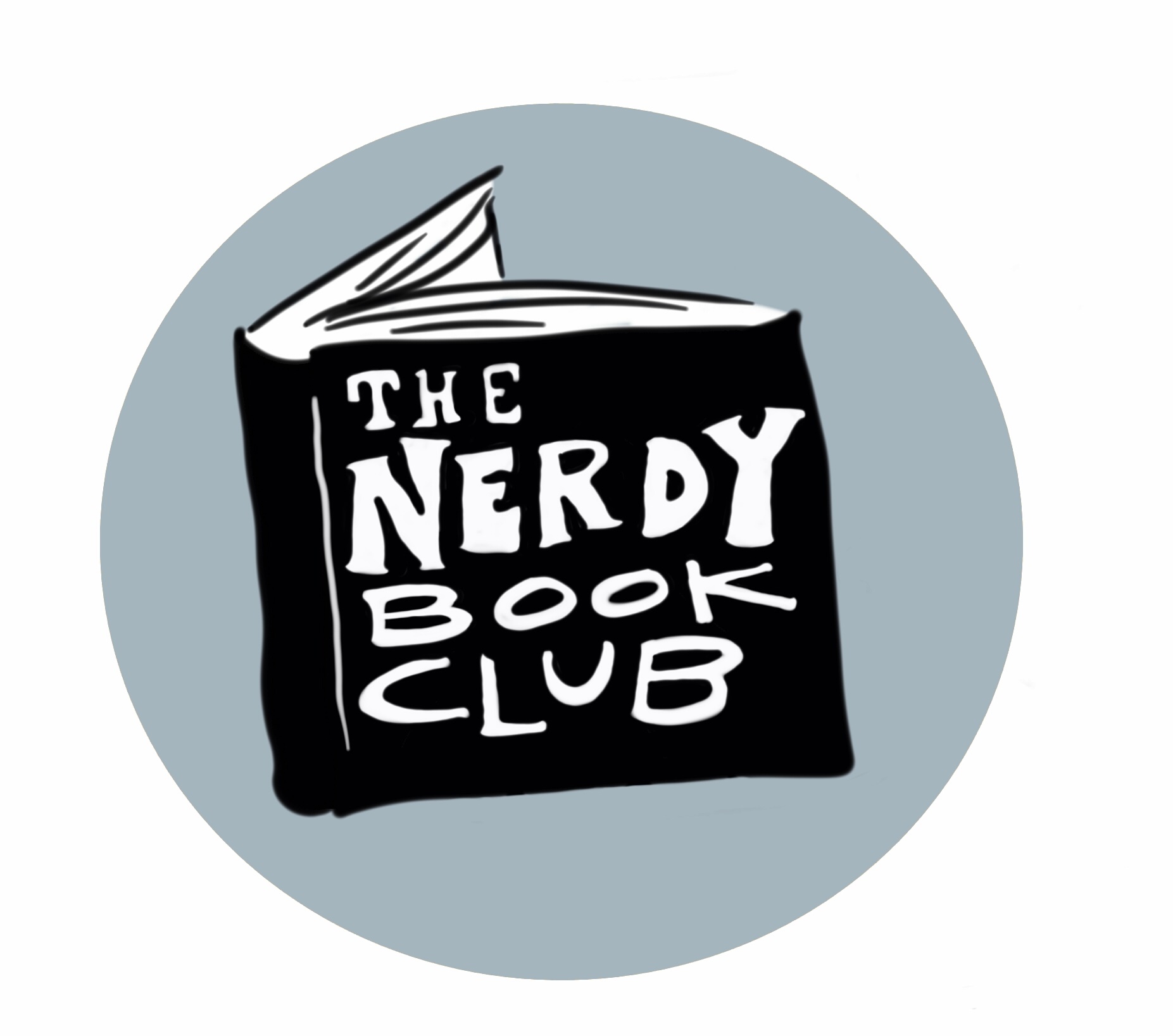Welcome to Inkygirl: Reading, Writing and Illustrating Children's Books (archive list here) which includes my Creating Picture Books series, Advice For Young Writers and Illustrators, Writer's and Illustrator's Guide To Twitter, Interviews With Authors And Illustrators, #BookADay archives, writing/publishing industry surveys, and 250, 500, 1000 Words/Day Writing Challenge. Also see my Inkygirl archives, and comics for writers. Also check out my Print-Ready Archives for Teachers, Librarians, Booksellers and Young Readers.
I tweet about the craft and business of writing and illustrating at @inkyelbows. If you're interested in my art or other projects, please do visit DebbieOhi.com. Thanks for visiting! -- Debbie Ridpath Ohi
Entries in Promotion & Marketing (14)
Golden Marmot Award: Chuck Wendig's "If you like a book" tweet
It's been a while since I've awarded the Incredibly Prestigious and Exquisitely Ephemeral Golden Marmot Award, but this week it NEEDS to go to Chuck Wendig for this wonderful tweet.
In addition to following @ChuckWendig on Twitter, I encourage you to read his Terribleminds blog. (*** To those offended by strong language: be warned that Chuck embraces it. :-)) While his focus is not specifically on children's books, many of his posts contain nuggets of wisdom useful to writers all genres.
Survey Results: "How Did You Find Your Agent?" "What Resources Did You Find Useful In Researching Agents?"

In my recent survey, I asked those of you working with agents to answer a few questions about how you got your agent. Here's what you said...
Want to support an author's or illustrator's new book but can't afford to buy it? Here's what you can do.

(Updated September 18, 2015)
The quandary: You want to support someone's new book and as much as you'd like to buy it, you can't. Perhaps you can't justify the cost of the new book right now. Perhaps your author friend is prolific and has multiple books coming out, and you can't afford to get them all. Perhaps you have so many author and illustrator friends that if you tried to buy all their books, you'd need to sell your car first. Or your house.
 Debbie Ridpath Ohi tagged
Debbie Ridpath Ohi tagged  authors,
authors,  community,
community,  finances,
finances,  illustrators,
illustrators,  promotion in
promotion in  Feature articles,
Feature articles,  Promotion & Marketing
Promotion & Marketing WHERE ARE MY BOOKS? Book Tour recap

I had a FANTASTIC time during my WHERE ARE MY BOOKS? Book Tour earlier this month. Thanks to Simon & Schuster Children's for making the book tour possible for me, and to all the schools, libraries and bookstores who participated.
For those interested, I've posted links to my photos and recap at DebbieOhi.com/2015booktour, including what I learned along the way.
Survey Results: What Agents, Editors and Art Directors Look For Online
In prep for my workshop at CANSCAIP's Packaging Your Imagination, I asked literary agents, editors and art directors a few questions about whether they research potential clients, authors and illustrators online and what they look for. 18 editors (some of whom also look for picture book illustrators), 8 agents and 2 art directors responded.
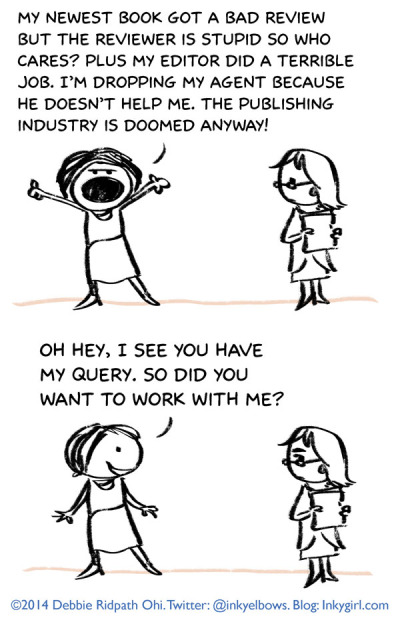
Here's what they said:
QUESTION: When you are considering taking on a new client/author/illustrator, do you ever research them online?
77% of respondents said that when they are considering taking on a new client, author and illustrator, they ALWAYS research them online. The rest said they sometimes do.
QUESTION: If you do online research before signing on a client/author/illustrator, has your research ever made you decide NOT to sign them on?
62% said that YES, they have decided to reject someone after researching them online. Some said that while they hadn't yet rejected someone after online research, they would definitely think twice about signing with someone who posts a lot of negativity (see below) or posts "with cringe-inducing syntax."
OTHER COMMENTS:
In this section, I invited respondents to volunteer additional comments, including turn-ons and turn-offs, what they look for during online research.
The following respondents gave me permission to use their names.
 Christie Harkin, Consultant Publisher at Clockwise Press:
Christie Harkin, Consultant Publisher at Clockwise Press:
"I have been turned off by authors/illustrators who bad-mouth their editors/publishers/agents. It is amazing to me when I see this on Facebook. Even if you don't mention your editor/publisher by name, it is usually very obvious to whom you are referring. I would definitely think twice about taking on someone who did this. Also, I look for authors/illustrators who are generous in sharing news about others in the community. People who only post promo about their own books (BUY MY BOOK! LOOK AT MY STUFF!) are not generally as well-received or connected with the larger community. If you are a new or emerging creator, you need to be engaging with others who are also plugged in to the kidlit world."
 Andrew Karre, Editorial Director at Carolrhoda Books/Lerner ( December 11, 2014 update: Andrew is joining Dutton Children's Books as executive editor on Jan. 12):
Andrew Karre, Editorial Director at Carolrhoda Books/Lerner ( December 11, 2014 update: Andrew is joining Dutton Children's Books as executive editor on Jan. 12):
"An extent online presence is not a necessity. It's gravy. But . . . I place a certain amount of value on a social media presence that seems human and natural and interesting. A Twitter stream that is full of interesting engaged conversations on a variety of topics--even topics other than books--is somewhat more interesting to me than one that is all review links and retweets. I don't much care how many followers. (Unless, of course, it's a huge number, because I am not an idiot about what that means.)"
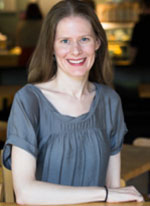 Carol Hinz, Editorial Director at Millbrook Press:
Carol Hinz, Editorial Director at Millbrook Press:
"I'm not necessarily looking for something in particular when I look up an author or illustrator. I simply want to find out if the person has a web presence and, if so, what it is. It's also helpful to get a sense of what else they've done, how they present themselves, whether they do school visits, and what helpful connections they may have (whether it's with other writers, educators, booksellers, etc.) when it comes to book promotion."
Other Comments:
NOTE: Most of the respondents answered anonymously but to avoid the awkward he/she decision, I decided to use "he" or "she" randomly.
One agent said she decided not to request material from previously published authors who got combative with reviewers. Another respondent said that while he hadn't yet rejected a project based on online research, he may make a note to discuss proper online etiquette with that particular author or illustrator. "But I believe the day is coming where my online research will make me answer 'no' when I question, 'Do I love this book enough to want to deal with THIS'?"
Another respondent said that online research sometimes makes her ask more questions, change the direction or focus of the conversation, dig deeper ("and not always in a negative way"), sometimes for the benefit of both of them and sometimes in ways that lead to more meaningful partnerships.
"Biggest turn-off: Writers who get argumentative and/or rude with reviewers and bloggers online. I also look at blog and social media posts that see how the writer comes across in their daily interactions. I'm wary when a writer acts rude, cynical, prejudiced, or pessimistic on social media. That's not to say that people can't have down moments, but if their overall feeds are full complaints and abuse toward others, it's an immediate "no." I've been lucky, though, to have found clients who are all positive, dedicated writers open to criticism and growing in their craft."
"I'm usually just looking for more information and/or to confirm my initial impression. I do notice if someone writes extensively about the writing and publication process ("got another rejection today!") or if he/she does a lot of self-publishing. Neither of these are deal-breakers at all, but they present unique challenges. I actually do most of my sleuthing with agents and agencies, and in that case I do judge if I see a lot of awful self-published covers (but again, may still work with them). Also, I assume writers and agents research me online but the less I'm reminded of that, the better—like don't start every email to me by mentioning something I've posted on Facebook. I don't like the feeling of someone friending me on social media in order to 'gain access.'"
"I look for obviously divisive posts, things that I see that I think would turn off a readership. Professionalism online is important, and also gives me an idea of what you'd be like to work with. I also look to see how you interact with others on your blog/twitter/site whether or not you acknowledge people who leave comments or tweet with you."
"Turn offs= being unprofessional/rude/inappropriate in a public online setting. Why would I want someone with that type of behavior linked to me as an agent and the agency as a whole?"
"When researching someone online, I'm generally just looking to flesh out my knowledge of that person in advance of a possible acquisition. I'm not actually looking for trouble spots, just maybe things to discuss at an IRL meeting with colleagues (sales points) or with the author themselves (small talk). When it's an illustrator, particularly; I do a lot of triage online before anyone's necessarily aware that I'm looking - I use online portfolios to identify leads. I'd advise artists to have as much art available to view online as possible. Use places like deviantart if you don't have a well-maintained personal site or an illustration agent with a good easily searchable site. Probably use deviantart even if you do. The easier your work is to find, the more work you'll pick up. I've been involved in acquisitions where a Google search turned up a certain amount of Internet Drama. It never really influenced the decision - we signed people up each time. I could imagine scenarios in which it would be a deal-breaker - for example, if we discovered that an author was a Neo-Nazi, that wouldn't play well - but none of them has so far come to pass. Incidentally, I think the situation in which duly diligent research is crucial is if you are an author or illustrator being offered work by a publisher or agent. You need to check out the bona fides of the person or company asking to contract with you, because there are an awful lot of sharks out there." - @iucounu on Twitter
"Turn ons - lots of work with the same energy and talent that brought the illustrator to my attention in the first place. Turn offs - samples that look dated, have styles that are very different and less appealing to me than the first sample I saw, very few samples."
"Online turn-offs: people who tweet way too often, people who only speak and don't engage others in conversation, people who are far too self-promotey, people who share way too much of their personal lives, people who are far too neurotic (tweeting constantly about writing woes and insecurities), people who are far, far, far too negative about anything and everything, and the biggest of all: people who feel the need to insult other writers/houses/editors/agents. Oh, and also, writers who quote themselves online. Online turn-ons: people who engage in meaningful discussion (without hitting me on the head with a hammer), people who find that balance between an online persona and being who they really are, people more interested in building a community than shilling their work, people who are endlessly supportive of fellow writers (without being obnoxious about it). What I really want to learn when I research a writer online is what they're after. Did they write the book to jump on the gravy train, hoping it would be the quick path to fame and fortune? Did they write the book because they scoff at the genre they just wrote and wanted to prove anyone could do it? Or is this someone who is serious about building a writing career and not just receiving the adulation of thousands of strangers? THAT'S the writer I want to work with. Someone dedicated to their craft and not their number of Facebook friends or Twitter followers."
(On whether they have rejected someone after online research) "Not if I really, really love the book, but if an author has exhibited abrasive or unpleasant behavior online, it definitely makes me think twice about signing them. When I sign someone, I'm not just signing up the project--I'm going to have to work with the author for a long time, and I prefer not to invite a headache into my life. While a great web presence is a definite plus, I'd never turn someone down for a lackluster web presence. But if I discover combative, difficult behavior, etc, I have to decide if this person is worth the unpleasantness they'll likely bring to my life. Because people are usually consistent--ie, if they're unpleasant to some people, they'll probably be unpleasant to me too if and when any difficulties in our working relationship arise."
-----
Curious about my other publishing industry surveys? Feel free to browse current and past Inkygirl Surveys online.
 Debbie Ridpath Ohi tagged
Debbie Ridpath Ohi tagged  agents,
agents,  art directors,
art directors,  editors,
editors,  online,
online,  poll,
poll,  survey in
survey in  Promotion & Marketing,
Promotion & Marketing,  Surveys and polls
Surveys and polls My First Author/Illustrator Skype Visit: What I Learned, What I'd Do Differently Next Time
 Skyping with 115 first-graders at A. Blair McPherson School in Edmonton, Alberta
Skyping with 115 first-graders at A. Blair McPherson School in Edmonton, Alberta
Although I've used Skype before, I resisted doing Skype classroom visits until recently because I wasn't confident about the technology working properly. Since I first tried Skype, however, broadband services have improved and more schools are starting to do Skype visits with authors and illustrators.
Other reasons I decided to explore visiting schools via Skype:
- I lack the time and finances to visit schools outside of the Toronto area. I also don't drive, which makes transportation more of a hassle and time-consuming.
- I had so much fun talking to young readers during my NAKED! book tour (thanks, Simon & Schuster!) that I want to do this more often than I have in the past, but am limited by the reasons mentioned above.
- Although I know they can't replace in-person visits, virtual school visits enable me to use more props in my presentations, a wider range of art supplies, show students around my home office, be able to pull out musical instruments (I have many) on whim.
- I know some schools can't afford a full school visit, so I decided to offer a 15-20 minute visit for free. Those who want a longer visit can pay my regular fee. I'm also relatively new to school visits, so this also gives schools an idea of what I'm like in person. When I do my next book tour, whether sponsored by one of my publishers or funded on my own, hopefully some of these schools will be interested in having me visit.
What I did before my first Skype visit:
- I researched a TON, searching online for blog posts by children's book authors and illustrators who have done Skype visits, as well as posts by teachers and librarians about Skype visits. I was especially interested in posts by children's book illustrators, since we have the advantage of being able to do drawing demos. :-)
- I talked to my friend Lee Wardlaw, who was also my first children's book writing mentor. Lee has a huge amount of experience presenting at schools and bookstores in person as well as via Skype. Do check out her Presentations page as well as her Secrets To A Successful Skype Visit for educators.
- I worked with teacher-librarian Arlene Lipkewich and A. Blair McPherson for my very first school Skype visit; their first-graders voted I'M BORED as their favourite book last year in their "YouDecide!" program. I started with a Skype test call with Arlene and another teacher, then a Skype call with Mrs. Brooke's second grade class. Arlene gave me useful feedback which I used to tweak my setup and presentation before I Skyped with five classes (115 students) of first-graders the following week. Thanks you, Arlene and A. Blair McPherson!
- I collected some of the useful resources I've found on my Skype School Visit Page for teachers and librarians as well as children's book authors and illustrators.
What I did during my 15-20 minute Skype visit:
- I read I'M BORED (for the second visit, I also read NAKED!). By the second visit, I was better able to monitor what I was showing the kids, so would zoom in on the Potato, for instance, when it was the kids' turn to yell "I'm BOOOOORED!" But I also tried to pull back sometimes, so they could see me as well.
- After the reading, I showed the students a sketch or two from the process.
- I pulled out my guitar and had students help me co-write a very short I'M BORED song.
- I did a drawing demo. The first time, I used my Derwent Inktense blocks to draw something and then used water to show the kids how the line turned into watercolor. I had the camera zoomed in close and later Arlene said that while this was great to see, it would have been great to see me as well. For my second Skypevisit, I decided to go with a big marker and watercolor paints instead, interacting with the students for suggestions on what to draw. It was fun but very messy on my end :-D -- I'll have to rethink this for my next Skypevisit.
- At the end, I did a Q&A. I loved hearing the types of questions asked by the kids. Some just came up to the laptop and didn't say anything, just smiled shyly or said (after a long pause): "I like your drawing!" One asked why the Potato in I'M BORED liked flamingos so much. I promised I'd ask Michael Ian Black, and he responded by email very quickly; I passed this answer onto the teacher afterward.
What I learned and what I'd do differently next time:
- It's sooooooo much more fun than I expected!
- I strongly recommend doing a Skype test call in advance of each Skype visit as well as just before the visit itself. I found this a great way of identifying potential problems and fixing them.
- Make sure you leave time for a Q&A, and coordinate with the teacher ahead of time so that he/she is able to have students prepare questions in advance.
- Figure out how to make my own screen bigger so I can see what the kids are seeing. Try to place this screen behind the webcam so I'm looking at the camera, not away.
- If I do painting, I will NOT set the paint cups on my desk where it's way too easy for me to knock them over in the middle of the Skype session (fortunately I didn't have much liquid in each)!
- Figure out how to mute the audio on my computer so I just hear it on my headphones. I found the echo a bit confusing, and was also worried about the echo leaking through into my microphone.
- I'm also going to investigate ways of sharing my screen, so I can show kids how I draw digitally. I think it will depend on partly on whether the school's Skype is able to do this, which makes a tech test in advance even more necessary.
Some useful resources (if you know of others, feel free to share below):
Please do check out the resource list I've compiled for teachers/librarians and authors/illustrators to my Skype page; I'll be gradually updating it.
Interested in having me do a Skypevisit with your school or library? Please see the info on DebbieOhi.com/skype. Hope to visit with you soon!
Next week, I'm Skyping (simultaneously) with third-graders in St. Paul and Boston, MN schools about I'M BORED. Can't wait. :-)
Trying out Authorgraph.com to digitally sign & doodle autographs
I read about Authorgraph.com letting authors digitally sign copies of their books on Mediabistro today, and have decided to try it out. You can see a sample of how the above doodle/signature was drawn (this is what a reader would receive as well). Here is the Author FAQ from the Authorgraph.com site.
The service is free, though Authorgraph.com points out that if a reader is using Amazon's Personal Document Service, Amazon may charge a small fee. At present, the site's only income-generating model seems to be through Amazon affiliate links.
Once you've signed your message and autograph, the reader who requested it has the option of downloading it as a PDF or AZW file, which can then be saved on devices or printed out. When printed out, the image fills an 8.5 x 11 sheet of paper. It would be nice if a reader had the option of a smaller size that is suitable for printing out and sticking inside the book. Savvy readers, though, will know how to shrink the image before printing.
Readers can also share their author autographs on Twitter. Here's a demo video:
Though the idea of being able to digitally sign a book is great, I can't help but be skeptical about the demand. I know that I'd far prefer a real-life ink autograph than a digital file that's been printed out...BUT Authorgraph.com's process saves the author the postage and printing costs/hassle of autographed bookplates sent by snailmail. Plus the opportunity for the reader to send a brief message to the author and then see the signature being drawn adds an extra level of personal interaction.
I'm intrigued enough that I'll be adding this to my I'M BORED Bonus Page and see how it goes.
More info about Authorgraph: http://www.authorgraph.com/
To request an Authorgraph from me about I'M BORED: http://www.authorgraph.com/authors/debbieohi
Sophie Blackall's 19th century style mailing promotes her new picture book
I always love hearing about interesting and unique ways (without being spammy) that children's book authors and illustrators have for promoting their work, so was intrigued by Sophie Blackall's promo effort:
 From Publishers Weekly (click on image to see original article)
From Publishers Weekly (click on image to see original article)
The package above was mailed out to about 100 chlidren's book professionals, handmade by award-winning illustrator Sophie Blackall to help promote THE MIGHTY LALOUCHE, a new picture book about a Parisian postman at the turn of the 20th century, written by Matthew Olshan and illustrated by Blackall.
What a wonderful package to receive in the mail!
Find out what was inside each package by reading the full article in Publishers Weekly.
Book Trailer Survey Results: What Works & What Doesn't

A couple of weeks ago I posted a survey (as part of my ongoing series of surveys) about book trailers and whether people thought they worked.
I've included some data details and a selection of comments at the end of the post, but here's a summary: 104 people responded. 85% of them said they had never bought a book solely because of a book trailer. 46% said a book trailer did have an influence on their buying decision, usually when they were already considering buying a particular book but were on the fence. 60% thought that book trailer sometimes helps sell books, depending on the trailer.
Overall, it doesn't seem clear that book trailers have a direct influence on book sales. However, they do make people aware that the book exists. Also, a number of teachers and librarians said that trailers for children's books were useful for showing students in schools.
What makes a good book trailer, according to most respondents who commented on the topic:
- Accurately conveys the mood of the book. The key is "accurately" - comments included complaints about trailers that were better or significantly different in feel from the book.
- Short and simple, and doesn't give away too many specifics of the book. ("The best book trailers are more like flap copy—setting the scene and the story, but not literally "showing" it to me. And they should be short. 2 minutes tops. 1.5 is better.")
- Rather than trying to reproduce scenes from the book in low-budget live action, good trailers instead focus on the essence of the book (mood, atmosphere). If you have the budget & expertise for high quality production & editing, then there's more leeway.
- For nonfiction books and picture books, show some interior pages (content not easily found elsewhere online).
Main criticisms of bad book trailers:
- Cheesy, melodramatic and amateurish-looking.
- Misleading - doesn't reflect what the book is going like, either in mood or content.
- Too long. Suggestions for max length: 30 sec-1.5 minutes. Max 2 minutes, though some said that even 2 minutes was too long.
- Illegal use of images or music.
Related online resources:
Why Flashy Book Trailers Don't Work - by Catherine Ryan Howard
Eight Million Viral Views Later: In Search of the Ultimate Children’s and YA Book Trailer on Publishing Perspectives
Why Book Trailers Are Now Essential to the Publishing Industry - Mashable
How To Make A Book Trailer - by teacher-librarian Michelle Harclerode
How To Make A Book Trailer by Myrlin A. Hermes
5 Free Tools for Creating Book Trailer Videos - by Richard Byrne
How To Make Your Own Book Trailer by Julie Cantrell
Some places where you can find kidlit/YA book trailers:
Mr. Schu Reads: Exploring Children's Literature Through Book Trailers
Also, many publishers have channels on YouTube where they will post book trailers.
MORE DETAILED SURVEY RESULTS:
104 people responded as follows:
1. Have you ever made a book purchase SOLELY because of a book trailer?
15.5% said YES, 84.6% said NO.

2. Have you ever purchased a book PARTLY because of a book trailer? (e.g. you were already considering buying the book anyway, but the book trailer helped convince you)
45.2% said YES, 54.8% said NO.

3. Do you believe that book trailers can help sell books?
27.9% said YES, 59.6% said SOMETIMES/DEPENDS and 12.5% said NO.

Selection of comments and comment excerpts:
"A book trailer can flop if the maker "Tries too hard." For me, someone tries too hard when it's too "shiny." There's too much going on. Background music along with a voice over and too much movement on the screen. Some really good book trailers I've seen have been almost minimalist. A few words on the screen, with a voice over. Ending with an image of the cover and date of release, or somesuch."
"Unless a book trailer is as professional-looking as a movie trailer, it is still going to look amateur-ish in my opinion. Better to let the book cover and description tell the story than to cheapen it with a trailer. Besides that, it takes either a lot of time or a lot of money on the part of the author, which could probably be better spent."
"I don't tend to do the "oh, I need to run out and buy that" unless I already know the author, and even then they're more likely to go onto a queue. However, there *have* been some book trailers which have called my attention to authors I didn't know, on the level of "Interesting concept. If the trailer's accurate, that's worth keeping an eye out for." On the other hand... Trailers are essentially equivalent to back-cover blurbs or equivalent-size print ads. We already know how misleading those sometimes are. On the other other hand, one _hopes_ that the author has more opportunity to review the trailer than the blurb. All of which boils down to: It's probably more effective than a typical small print ad, for me. But I'm honestly not sure how much bang for the buck it actually delivers. And I'm atypical, both in being a sf geek and in being the son of an ad man."
"Trailers full of illegal images grabbed off google search, or with equally illegal use of music, ensure that I will never read the book. Ever. It shows that not only is the book self-pubbed, but self-pubbed by someone who has no artistic integrity and no sense of professionalism. Trailers that work as movies are hard to do, and risk being too long and too cheesy. Image trailers need to be professional and respective of other artist's rights. The images need to match in type, whether they be photos vs illustrations etc. Video trailers need to be short, SHORT, and with a strong hook. The trailer for Miss Peregrine's Home for Peculiar Children, for instance, was better than the actual book it advertised. Personally, I liked the trailer for Across the Universe by Beth Revis. Visually simple, legal stock images, nice voice-over, and a great hook."
"Book trailers need to be more professional, made properly like a film trailer. Just using screenshots of text set to copyright-free music isn't really enough. We need to see imagery and hear realistic voice-overs... the book trailer needs to accurately capture the feel of the book. Done properly, book trailers can be as exciting as film trailers, and play a key marketing role."
"I usually turn off the radio or change the channel when I see book trailers. For the most part, they're too cheesy and don't really portray the "feel" of the book itself or what the reader can expect from it."
"For me as a market target (I buy and read a LOT of books), a trailer is most effective when it's 1) short 2) has great music 3) expresses the high concept of the book only (I can click through to a synopsis) 4) doesn't attempt production values it can't afford (I'd rather see something simple that's well done)"
"I've watched trailers for books I'd have never heard of without someone linking to the video as being entertaining or worth watching. With those books, I decided that the book wasn't for me, but raising awareness can't hurt."
"They need to be done professionally, have either simple text to read or a narrator. I hate amateur videos with scrolling text and terrible blurry photos set to music"
"Answer to number 3 is actually "not to me". I know some people are fascinated by video and might be thus lured to a book - I am bored or uninterested (you could have given me that info a lot faster/clearer in text!), so avoid trailers. And when I can't avoid them, I glaze over pretty fast. I have enjoyed some trailers, I think, in and of themselves - which usually means they have good music and/or enjoyable graphics - but as a lure for a book? No."
"Book trailers assume somebody's going to watch them, and that somebody is going to get their ideas of which books to buy through watching book trailers. I'm not sure that particular audience exists. I think they're more useful as an educational tool to start classroom discussions about books, or maybe to be used by librarians/teachers as booktalks for getting them to read the book."
"It has to be noted that book trailers are advertising vehicles, not sales-promotional tools. There must be a clear set of objectives defined before the trailer can be created. Otherwise, you end up with a slide show that is not truely representative of the book. Too many trailers fail, and are far too long. Have a look at mine and tell me what you think. Cheers! Gerry"
"Don't have the book's characters in the trailer. Books are often sold based on the author's name (why the type is always the same size or bigger than the title, I wager), so sell me the author. ... Children's books are quick bursts of entertainment, and I don't need to be sold on Patricia Storms the author, I'd actually prefer to see a pirate and a penguin do a little dance. Whatever you do, though, hire me to shoot and edit it :P Just remembered, one of my first video gigs was a book trailer of sorts! https://vimeo.com/23288627 … I'm a lot better now than I was then, heh."
"I bought Leviathan 95% because it had an awesome trailer, but it's also the only trailer I've ever loved that much. I've enjoyed a few since then (the Born Wicked trailer comes to mind, along with Shiver), but with those I'd already planned on buying the book. For me, a good trailer is one that doesn't look amateur, that makes use of good costuming (if using actors) and lighting, that is careful with the details."
"Like a good cover for a book or a good song on an album, a trailer can create an atmosphere, evoke a feeling or mood that might snag some readers. Frankly, I don't see a lot of book trailers because I don't go looking for them. They are not necessarily right in front of the consumer the way a tv ad is."
"Sometimes they're great as little 'shorts' in their own right but like with movies, the more 'teasing' and 'mysterious' a book trailer is, and the less information it gives, the less inclined I am to bother following it up. The "This Is Not My Hat" trailer for Jon Klassen's upcoming book is a great example of a trailer (for a children's book, at least) done absolutely right."
"But then again, I make them. For my own book, as well as for others. http://224pages.com"
"Adding various media to your marketing strategy is usually a good idea, though it seems that few people probably buy based solely on the trailer (hopefully this survey will say for sure!)"
"I would rather read back cover copy than watch a trailer."
"Hi, I enjoy making trailers for my own books. So far I have made three, but before I even started I watched many, many trailers in order to find out what I did and didn't like about them. While there was much I admired about the ones I've seen (and yes, I did buy books because of them!), there were quite a few that had the following problems: a) they were too long, b) they could be very repetitive (same action or pictures repeated several times in the same trailer, c) the music was overwhelming, too dramatic, and didn't match the story, d) the same music had been used too many times on other trailers, e) the voice-over was muffled, too fast, or had a tone/quality that I then didn't want to read, and f) the trailer was SO professionally produced, acted, etc. that there was no way it could ever match the book, i.e., it really seemed like the trailer to a film, not a book, and I felt like I had seen too much already. I've now presented several seminars on making trailers, and these are the main points I do my best to help others avoid."
"I have books with trailers but is it impossible to tell if they are creating sales, so will be interested to see what your find."
"I loved The Chicken Problem book trailer. I also loved the I'm Bored song trailer thing. I'd like to see book trailers for graphic novels. Usually when I see book trailers they are posted with reviews or comments, so it's hard to say that I've ever purchased a book solely based on a book trailer."
"Hello, The example below is just the beginning and the end of the trailer, but are the parts that really hooked me. "The Red Garden introduces us to the luminous and haunting world of Blackwell, Massachusetts, capturing the unexpected turns in its history and in our own lives. In exquisite prose, Hoffman offers a transforming glimpse of small-town America, presenting us with some three hundred years of passion, dark secrets, loyalty, and redemption in a web of tales where characters' lives are intertwined by fate and by their own actions. . . . . . . . Beautifully crafted, shimmering with magic, The Red Garden is as unforgettable as it is moving." This trailer really made the book seem rich and deep, but Alice Hoffman is not a hard sale anyway. Thank you, Ann"
"I guess I'm too old school i.e. book trailers are too flash for me. I saw a few and I was put off. I tend to stick to my favorite authors who don't need to create trailers to sell books. If I hear about a good book (outside of my favorite authors) I'll research it further to see if I'll like it. if so I'll buy it."
"Don't give away too much. It's just like with movie trailers. If I feel like I've practically read the book by watching the trailer, I won't read the book."
"Most book trailers are just so cheesy, that they do more harm than good sometimes."
"I think some teachers use mine in schools but I'm not sure they really sell books."
"A book trailer needs to give me something I can't get from looking at the cover and reading the back cover copy. It needs to portray a sense of emotion and tone. I don't want to see the authors vision of a low budget film based on their book. Makers of book trailers would do well to study successful television and radio commercials. Keep them short (30seconds), match your music to the tone of the product (book) but remember it's background music and not the star of the show. Grab me with something shocking, funny, or unusual in the first 5 seconds if you want me to keep watching."
"I think trailers have not quite caught on yet - personally, I haven't bought a book because of one. But I do say sometimes, as I think they will become more and more important as book buyers become aware of them. I am an author - and I have begun work on a book trailer. So, I'll see what happens."
"I think that a decent, fun book trailer gets shared around the internet, so I think that's the main reason to make one. I like book trailers that show the inside and outside of the book, especially for picture books and art books. I like to see the physical-ness of the book. Too many sites don't show what the insides look like. I wanna know what I'm buying!"
"Book trailers totally grab my grade 3-5 students. Books that have a trailer fly off the shelf after I have book talked them using the trailer as a supplement."
"I use them in the media center. When I show one to my students they line up to check the book out."
"The best book trailers (to me,) focus on the book and not on dramatizing scenes from the book. When I see a trailer that looks like a movie, I always think: "Wow—I'd see that movie." But I never think: "I want to read that book." They feel counter- productive to me. Also, I don't always like seeing actors as the characters—it interferes with what I see in my head. The best book trailers are more like flap copy—setting the scene and the story, but not literally "showing" it to me. And they should be short. 2 minutes tops. 1.5 is better."
"Goals for a good trailer: -Set the tone -Inform the reader about the book -be entertaining -market towards target audience in imaginative ways (e.g. If the book is about how to take care of your dog, try to have links with pet stores, grooming stores, etc. and not just book trailer sites)"
"Isn't a book trailer just a commercial for a book? If done well it can help, if done poorly it can hurt."
"I think if a trailer is done right it can boost readership. I have never decided not to read a book based on the trailer, but I have chosen to read one I'm borderline on after seeing a good trailer for it."
"I am answering as a librarian. I can say that professionally created BTs of 30 seconds in length are an invaluable tool in spotlighting books on our middle school morning news show which reaches 1000 students per day. Longer trailers can generate interest but can only be shown to the class I'm working with."
"I don't know if there is a solid venue for book trailers? I think there needs to be more awareness of them."
"Most book trailers I have seen are cheesy and melodramatic. I usually avoid them."
"As an illustrator, I find the thumbnail of the trailer video important. It makes me decide to play it or not. Sneak peek pages could be more effective than trailers."
"Don't like live action book trailers. Prefer artsy ones that hint at the themes in the books. (See Maggie Stiefvater's trailer for The Raven Boys or Laini Taylor's trailer for Daughter of Smoke and Bone) Must have appropriate music. Badly done book trailers can do more damage than good. Those by self-pubbed authors tend to be generic and poorly produced. Spelling/grammar mistakes in a book trailer will make me not buy the book. This is a deal breaker."
"I don't understand book trailers at all. I don't get why people make them or watch them. They never tell you anything. Unlike movie trailers they can't even tell you if the movie will be well shot or well acted because books have no cinematography or acting. A book trailer is just a really self indulgent commercial. This book is sooo awesome, let me show you show pictures and clips relevant to the storyline while someone tells you how awesome it is. You should buy it. I have strong opinions on book trailers but maybe I'm in the minority."
"If the trailer is good, I think it helps. (Well I hope so or my trailer is a waste of time) I have seen some really bad trailers that made me decide not to buy a book."
"It seems like book trailers are getting shorter, which I think is a good thing. 2:00 is a lonnnnng trailer to me."
"Book trailers can be intriguing and build up higher interest in the book. But only if done professionally. Many, many book trailers I've seen are clearly not the author's forte, nor properly funded by the publisher. A cheap-looking trailer (for me) often makes me skeptical of buying the book because then I'm left wondering where else they cut corners."
"I don't see many book trailers. Every once in a while one will pop up, but without them being prevalent, it's hard for them to work. Also, since book trailers are a somewhat recent advertising scheme, a book trailer feels like a ploy to sell a book that wouldn't sell based on the quality of writing."
"My cousin uses them in her English class and I used them in my teen book club."
"I love movie-like book trailers, but they're expensive to get right. So unless writers have a big budget or an extremely talented friend, it's best if they just go with an amazing photo/words slideshow (and put the money into great music) or use the low-budget aspects as part of the story (character relating things to his own webcam, jostled smartphone video, etc.)."
"For me I don't really see the point. But some trailers are cute, I guess"
"Book trailers need to be more like a hook, a why-to-read pitch, not an overview or summary of plot points. Bad ones can really turn me off."
"Some very good trailers have lead me to take the books out of the library and recommend the trailer to others who may have purchased the book. As well, I have a couple of books on my to-read list because of a trailer. A lot of trailers are crap. Slow. Long. BORING! Look homemade. Uck. They are a couple of slides and photos in PowerPoint and (sadly) look it. They lack originality and don't pull the reader in. They have to, have to have to. And if you can entertain--please do! Bobbie Faye's Very, Very, Very Bad Day is AWESOME. As well I love the Sense and Sensibility and Sea Monsters. So funny. Love the humour!"
"Twice now I've bought a book because I liked the trailer, but after I read the book I usually felt let down, because the trailer was better, or significantly different in feel, from the book."
"ONLY IN NON-FICTION. I cannot stress this enough. The only time I have ever bought a book from a trailer, it was a quilting book that I bought because the trailer showed all the quilts and patterns and I couldn't find interior pictures of the book elsewhere."
 Debbie Ridpath Ohi tagged
Debbie Ridpath Ohi tagged  books,
books,  promotion,
promotion,  publicity,
publicity,  trailers in
trailers in  Promotion & Marketing,
Promotion & Marketing,  Surveys and polls
Surveys and polls David LaRochelle: Children's Book Author/Illustrator AND Pro Pumpkin Carver
Wow, check out the amazing kidlit-focused pumpkin carved by children's book author/illustrator David LaRochelle:
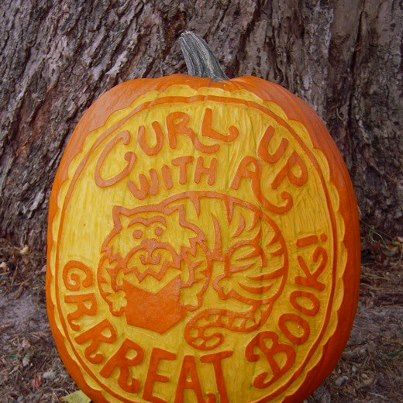
From David:
"Chronicle Books held a promotion in conjuncture with my new book "It's a Tiger!" The winning bookstore won a custom designed pumpkin carved by me. Here is the pumpkin I carved today for Riverwalk Books in Chelan, Washington."
See a video of David carving pumpkins:
Pro-Pumpkiner from Ben Garvin on Vimeo.
 Debbie Ridpath Ohi tagged
Debbie Ridpath Ohi tagged  craft,
craft,  halloween,
halloween,  promotion,
promotion,  pumpkin in
pumpkin in  Inspiration,
Inspiration,  Picture books,
Picture books,  Promotion & Marketing,
Promotion & Marketing,  Random Diversions,
Random Diversions,  Videos
Videos I'M BORED is A Junior Library Guild Selection!
Last week, I was tickled to get a package from Simon & Schuster Books For Young Readers that contained a letter of congratulations from the Junior Library Guild (see bottom of post) as well as a certificate….

... and a cool lapel pin:
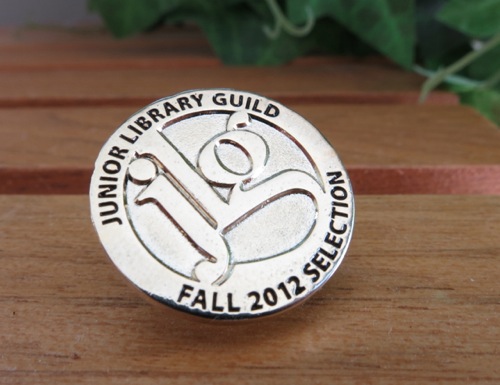
I had seen "A Junior Library Guild Selection" on book covers before but confess that up to now, I didn't know that much about the designation. So in addition to asking my editor and publisher (Justin Chanda at Simon & Schuster Children's), I also did some research online.
What I found: Having your book selected by the Junior Library Guild is a BIG DEAL.
Apparently the JLG editorial team reviews thousands of new titles each year, in manuscript or prepublication stage, and end up choosing what they say is "the best of the best." According to the Junior Library Guild website, nearly 95 percent of their selections go on to receive awards and/or favorable reviews.
JLG's mission: to help libraries wade through the mass of books published every season and pick what’s best for their collections. You can read about different ways that schools and libraries have been using JLG to cope with staff and budget cuts, etc.
What does all this mean for an author and illustrator? Good things. It means that JLG orders a bulk quantity of your book from your publisher, then includes your book in their recommend lists…and these lists are used by schools and libraries. When I posted the announcement on my personal Facebook Wall, one friend said:
"Excellent! That means that there is a high probability that my school district will buy it for all of our elementary schools; they rely on the JLG lists for purchases!"
Yay! :-)
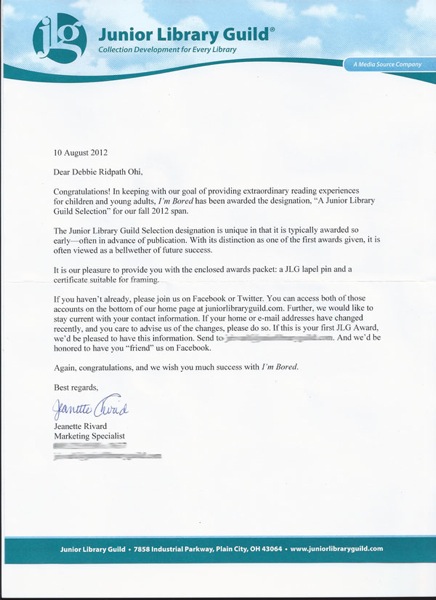
In summary:
I am absolutely thrilled to have I'M BORED chosen as A Junior Library Selection, and am grateful to the JLG for the honor.
More more info about the Junior Library Guild:
On Twitter: https://twitter.com/JrLibraryGuild
On Facebook: https://www.facebook.com/pages/Junior-Library-Guild/329843906949
Creating book trailers for YA fiction anthology TOMO
As I've mentioned before, one of my short stories appears in the just-released YA fiction anthology, TOMO: Friendship Through Fiction (Stone Bridge Press, Mar/2012). Proceeds will benefit teens affected by the 2011 Japan quake/tsunami.
I created two book trailers to help promote the anthology. The editor, Holly Thompson, helped me collect the materials I needed.
Here's the shorter trailer (37 seconds):
and here's the longer trailer (1 minute, 20 seconds):
I used iMovie to create both. For the first, I used music that came with the iMovie software. Holly provided the music for the second trailer. I used Photoshop CS5 to create some of the background and compilation images.
I can already see places for improvement, but I only had a short time to put the trailer together and have very limited experience with book trailers. Learned a lot during the process! Like the importance of figuring out the purpose of book trailer before I start working on it, and to identify the target audience.
I never assume that people are going to be patient enough to watch through the entire trailer, so I purposely put the essential book info at the beginning of each trailer. At first, I worked on a trailer that was mainly focused on the disaster in Japan but then realized that people would assume most of the stories were going to be depressing or about the quake and tsunami (and they aren't!).
So I decided to put more of an emphasis on the people behind the project, especially editor Holly Thompson.
Anyway, I hope you like the trailers! Please do share them, and consider supporting the project by buying the book. You can find out more info about TOMO at:
Daniel Nayeri: Book Commercials vs Book Trailers
Straw House, Wood House, Brick House, Blow - Wish Police Commercial from Candlewick Press on Vimeo.
Instead of making a book trailer for Straw House, Wood House, Brick House, Blow, his collection of four novellas from Candlewick, Daniel Nayeri commissioned four mini-commercials instead.
LOVE these! They're short and intriguing, and get a potential reader's attention. Many of us aren't able to afford hiring the people that Daniel did, but I do think that there are elements in these commercials that the rest of us can apply, such as keeping the video promo short. Also, I like the way the video gets across a sense of the presentation of the book, the tone and the ideas in such a short time, without attempting to summarize the plot.
You can find out more about Daniel's thoughts on book commercials, promotion and his recent projects in Mary Cole's interview at Kitlit.com.
You can also see his four book commercials on Vimeo.





